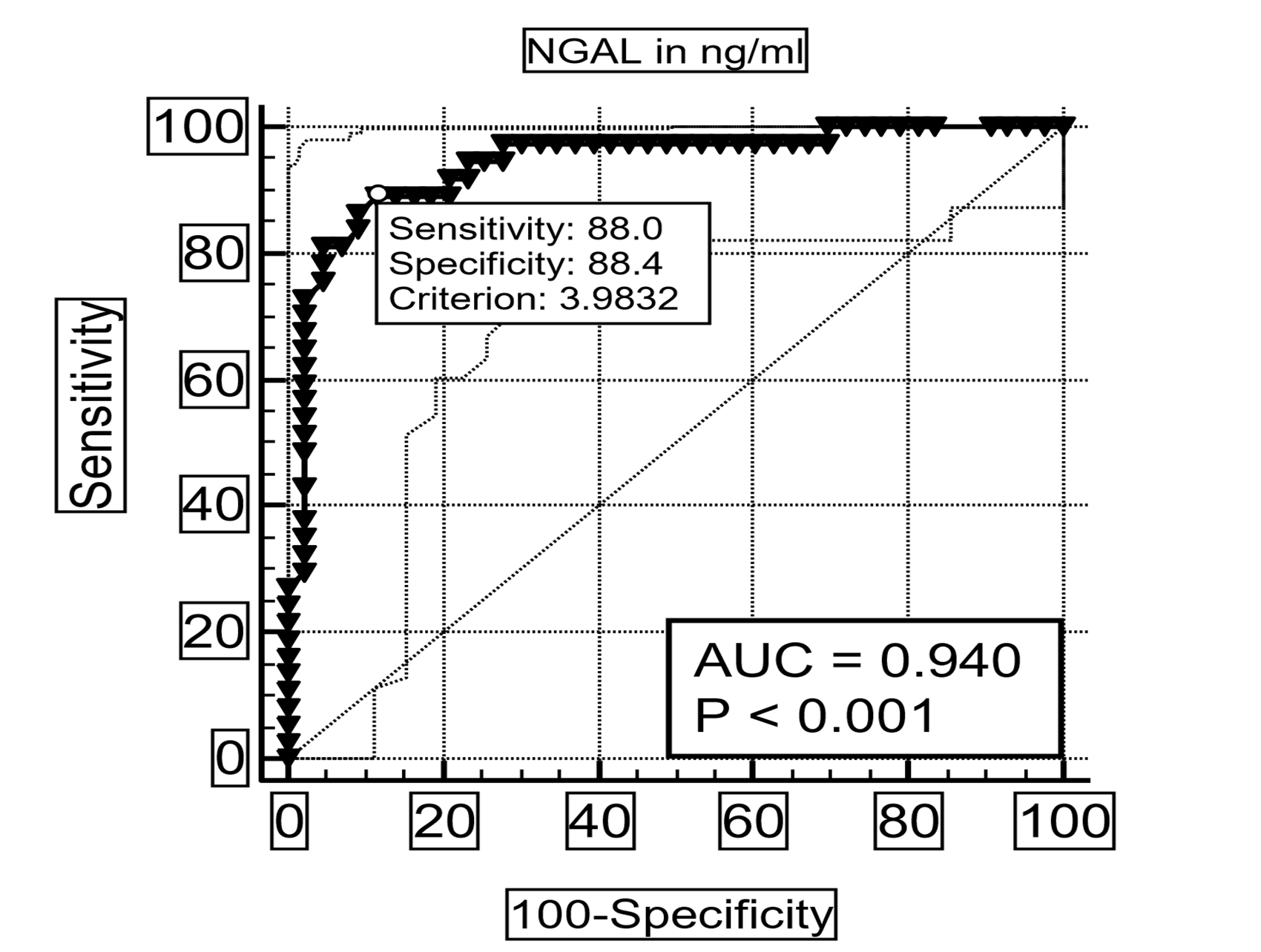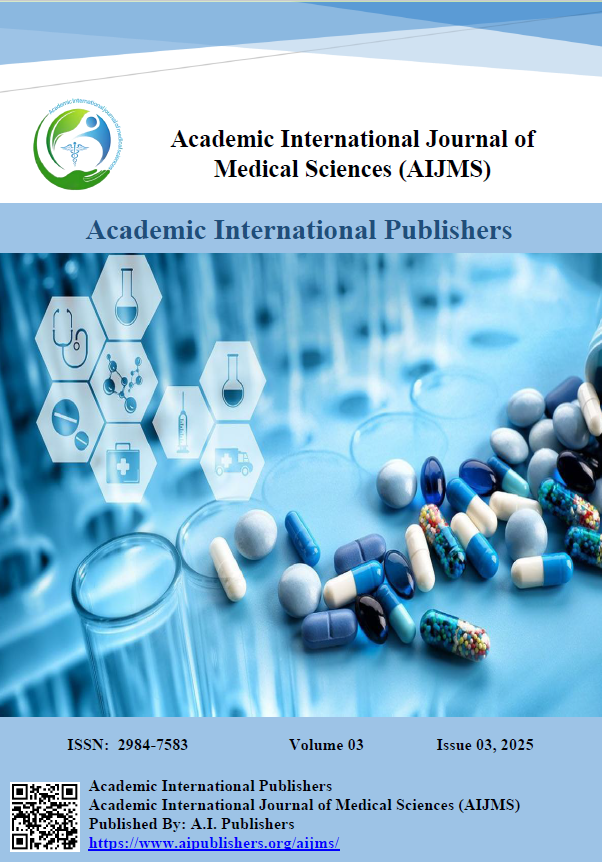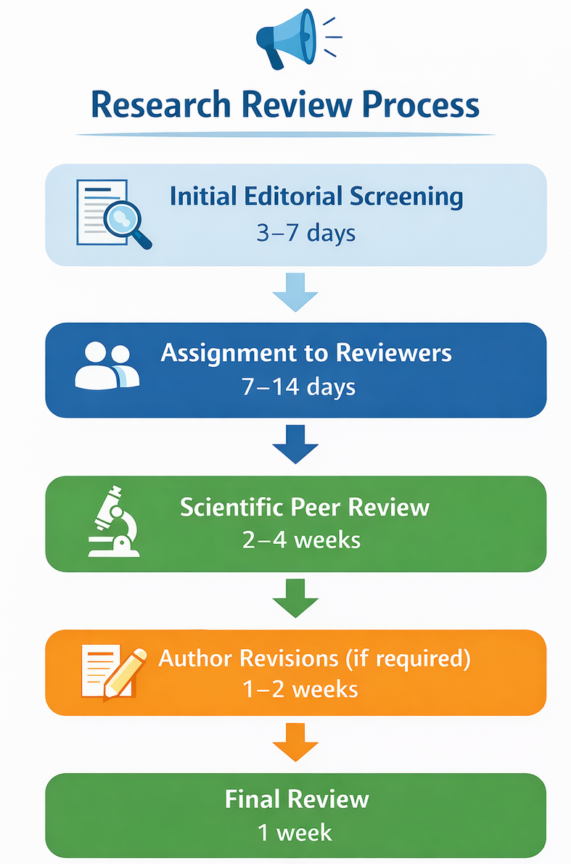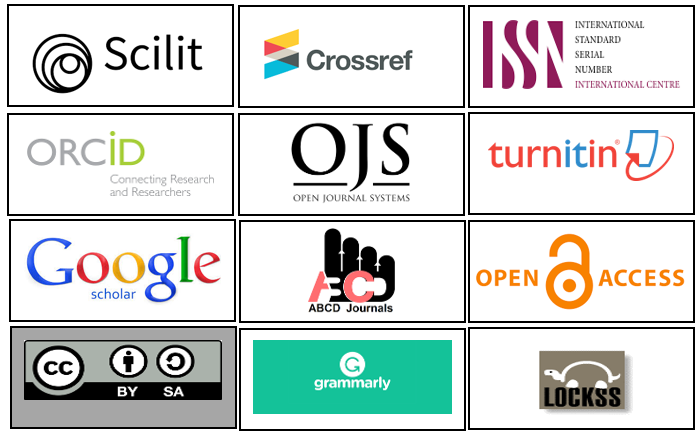Assessment of Neutrophil Gelatinase Associated Lipocalin in Children with Acute Gastroenteritis and Dehydration to Identify Early Signs of Acute Kidney Injury
DOI:
https://doi.org/10.59675/M224Keywords:
NGAL, Pediatrics, Dehydration, Serum Creatinine (SCr)Abstract
Background: Gastroenteritis often correlates with acute kidney injury (AKI) in children who are hospitalized. The primary diagnostic test for acute kidney injury (AKI) in modern times is serum creatinine (SCr), which increases in the presence of AKI and is eliminated by glomerular filtration. SCr is an unsuitable biomarker for renal sickness because it lacks specificity and a slow response to disease severity or treatment changes. NGAL, or neutrophil gelatinase-associated lipocalin, is a molecular weight of 25 kDa protein and forms a covalent bond with neutrophil gelatinase. Elevations in NGAL levels due to kidney injury have important predictive value and may forecast the onset of acute kidney injury (AKI) 24-72 hours before an increase in diagnostic serum creatinine (SCr) values.
Aim and objectives: This study aims to determine whether plasma NGAL concentrations in mild, moderate, or severe dehydrated acute gastroenteritis patients may indicate acute kidney damage (AKI). The research will investigate whether acute renal injury and plasma NGAL concentrations are connected. Patients and methods: The cross-sectional design was employed in this study and included 80 patients who attended the pediatric gastrointestinal clinic at Babylon Children's Hospital. Between November 2022 and June 2023, all patients had gastroenteritis symptoms accompanied by different dehydration levels. Results: Patients with severe dehydration had considerable higher level of NGAL than those with mild to moderate dehydration (p<0.001). There was a notable inverse relationship (p = 0.046) between the NGAL level and potassium but a considerable direct link (p<0.001) between the NGAL level and creatinine. However, no significant correlation was seen between the NGAL level and urea (p = 0.404 and 0.062, respectively). The confidence range for the area under the curve (AUC) is 0.940 to 0.981, with a confidence level of 95%. The p-value is less than 0.001. The sensitivity is 88%. An accuracy of 88.4% has been attained. The NGAL cut-off point is 3.9832.
Conclusion: An analysis of plasma neutrophil gelatinase-associated lipocalin (NGAL) in individuals with gastroenteritis and varied degrees of dehydration indicated a clear and direct link between the two parameters. Specifically, when dehydration worsened, the average NGAL value increased
References
Andreoli SP. Acute kidney injury in children. Pediatric nephrology. 2009;24(2):253-63. DOI: https://doi.org/10.1007/s00467-008-1074-9
Krawczeski CD, Woo JG, Wang Y, Bennett MR, Ma Q, Devarajan P. Neutrophil gelatinase-associated lipocalin concentrations predict development of acute kidney injury in neonates and children after cardiopulmonary bypass. The Journal of pediatrics. 2011;158(6):1009-15. DOI: https://doi.org/10.1016/j.jpeds.2010.12.057
Chakraborty S, Kaur S, Guha S, Batra SK. The multifaceted roles of neutrophil gelatinase associated lipocalin (NGAL) in inflammation and cancer. Biochimica et Biophysica Acta (BBA)-Reviews on Cancer. 2012;1826(1):129-69. DOI: https://doi.org/10.1016/j.bbcan.2012.03.008
Seibert FS, Pagonas N, Arndt R, Heller F, Dragun D, Persson P, et al. Calprotectin and neutrophil gelatinase–associated lipocalin in the differentiation of pre‐renal and intrinsic acute kidney injury. Acta Physiologica. 2013;207(4):700-8. DOI: https://doi.org/10.1111/apha.12064
Gj S. A simple estimate of glomerular filtration rate in children derived from body length and plasma creatinine. Pediatrics. 1976;58:259-63. DOI: https://doi.org/10.1542/peds.58.2.259
Liu L, Johnson HL, Cousens S, Perin J, Scott S, Lawn JE, et al. Global, regional, and national causes of child mortality: an updated systematic analysis for 2010 with time trends since 2000. The lancet. 2012;379(9832):2151-61. DOI: https://doi.org/10.1016/S0140-6736(12)60560-1
Çelik T, Altekin E, İşgüder R, Kenesari Y, Duman M, Arslan N. Evaluation of neutrophil gelatinase-associated lipocalin in pediatric patients with acute rotavirus gastroenteritis and dehydration. Italian journal of pediatrics. 2013;39:1-4. DOI: https://doi.org/10.1186/1824-7288-39-52
Jo SK, Rosner MH, Okusa MD. Pharmacologic treatment of acute kidney injury: why drugs haven’t worked and what is on the horizon. Clinical journal of the American Society of Nephrology. 2007;2(2):356-65. DOI: https://doi.org/10.2215/CJN.03280906
Antonopoulos CN, Kalkanis A, Georgakopoulos G, Sergentanis TN, Rigopoulos DN. Neutrophil gelatinase-associated lipocalin in dehydrated patients: a preliminary report. BMC research notes. 2011;4:1-2. DOI: https://doi.org/10.1186/1756-0500-4-435
Schmidt-Ott KM, Mori K, Li JY, Kalandadze A, Cohen DJ, Devarajan P, et al. Dual action of neutrophil gelatinase–associated lipocalin. Journal of the American Society of Nephrology. 2007;18(2):407-13. DOI: https://doi.org/10.1681/ASN.2006080882
Dent CL, Ma Q, Dastrala S, Bennett M, Mitsnefes MM, Barasch J, et al. Plasma neutrophil gelatinase-associated lipocalin predicts acute kidney injury, morbidity and mortality after pediatric cardiac surgery: a prospective uncontrolled cohort study. Critical care. 2007;11:1-8. DOI: https://doi.org/10.1186/cc6192
Fadel FI, Rahman AMOA, Mohamed MF, Habib SA, Ibrahim MH, Sleem ZS, et al. Plasma neutrophil gelatinase-associated lipocalin as an early biomarker for prediction of acute kidney injury after cardio-pulmonary bypass in pediatric cardiac surgery. Archives of Medical Science. 2012;8(2):250-5. DOI: https://doi.org/10.5114/aoms.2012.28552
Peco-Antić A, Ivanišević I, Vulićević I, Kotur-Stevuljević J, Ilić S, Ivanišević J, et al. Biomarkers of acute kidney injury in pediatric cardiac surgery. Clinical biochemistry. 2013;46(13-14):1244-51. DOI: https://doi.org/10.1016/j.clinbiochem.2013.07.008

Downloads
Published
Issue
Section
License
Copyright (c) 2024 Academic International Journal of Medical Sciences

This work is licensed under a Creative Commons Attribution 4.0 International License.








